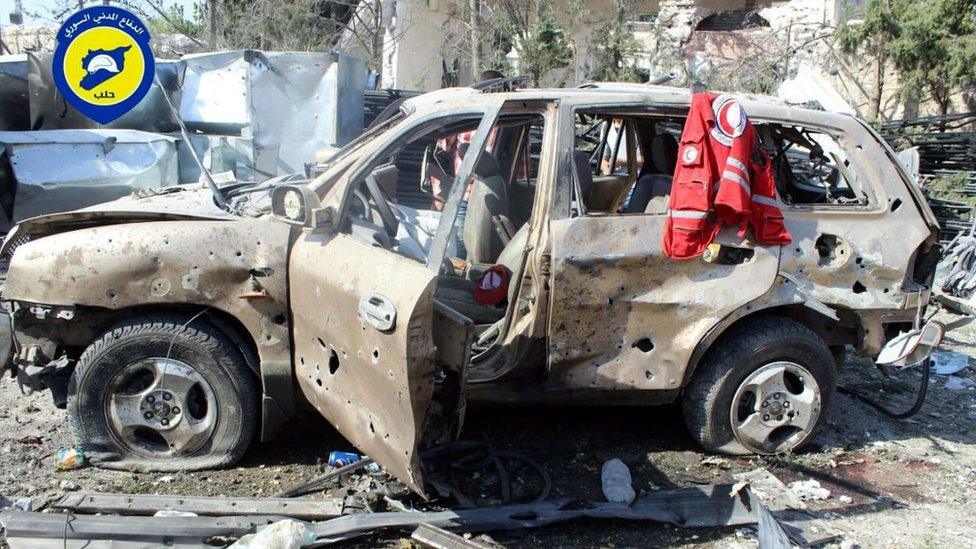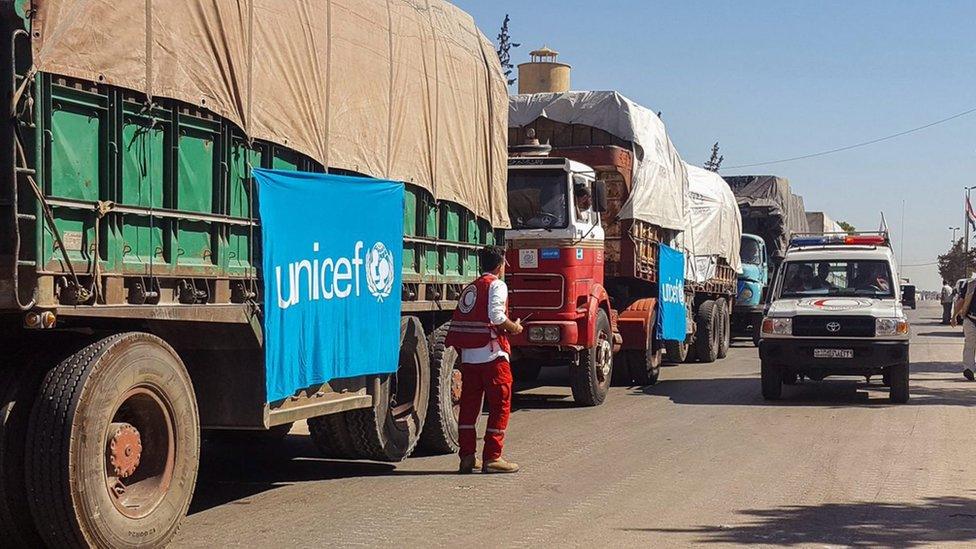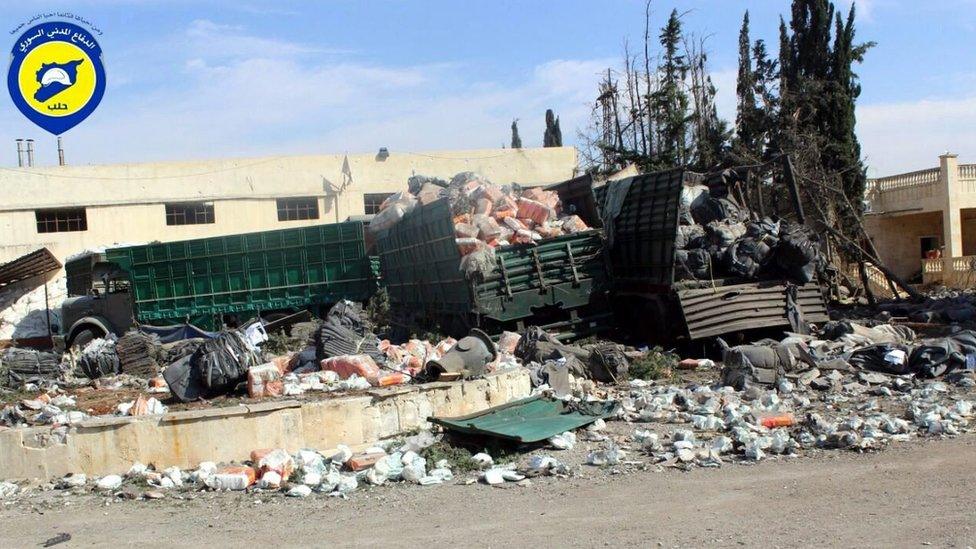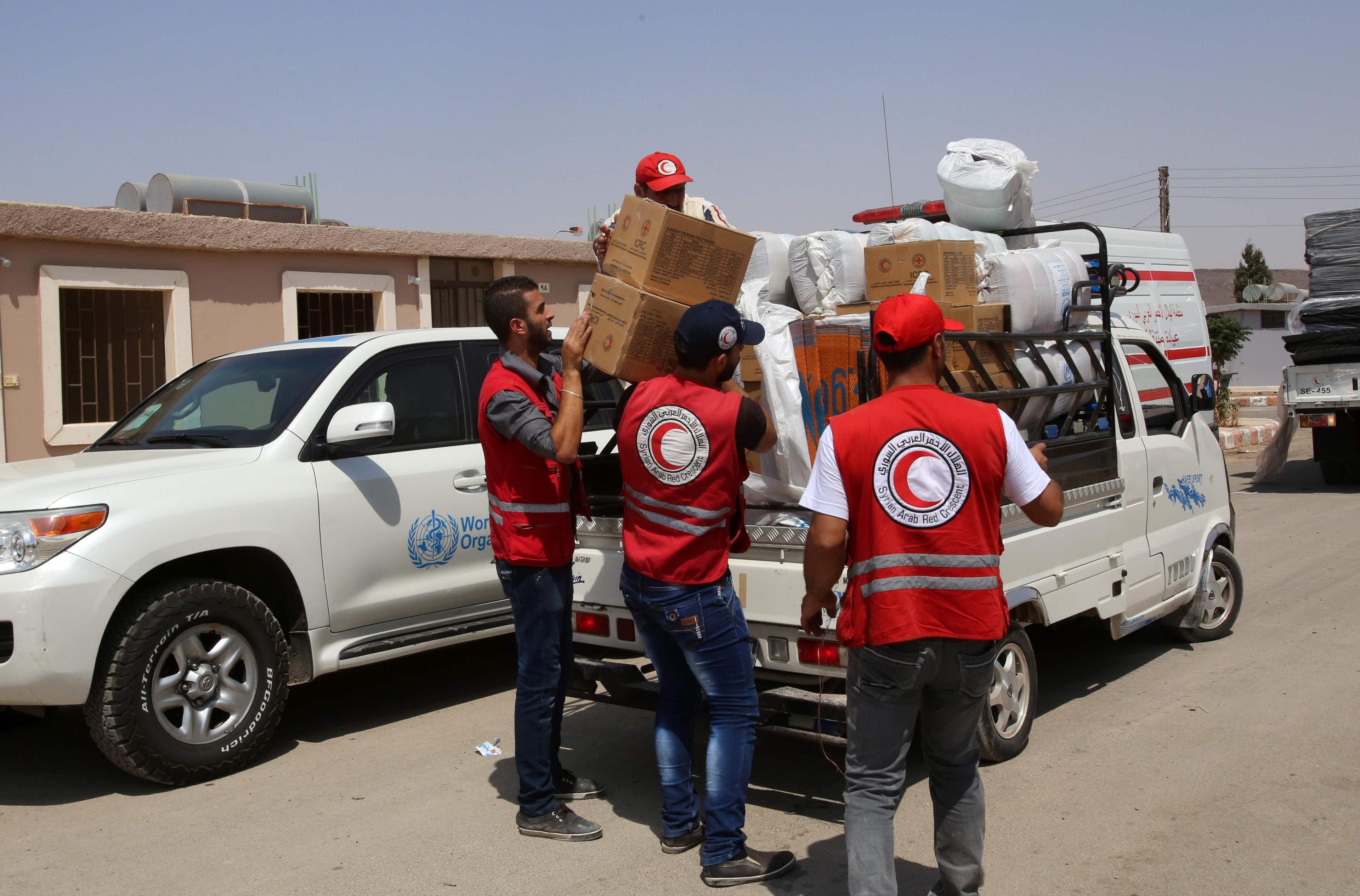Viewpoint: Why it is unconscionable to attack Syria's aid workers
- Published

The convoy was delivering aid for tens of thousands of people in Urum al-Kubra when it was hit
The deadly bombing of a UN-aid convoy in a rebel-held part of Syria last Monday threw the spotlight on the dangers facing humanitarian workers there - and the suffering of civilians whose lives depend on their help.
Here, Robert Mardini, Middle East Director at the International Committee of the Red Cross (ICRC), speaks out against a growing catalogue of attacks on aid workers in the Syrian war.
As dawn broke, the twisted, smouldering wreckage of the aid trucks was visible for all to see. Twenty people dead and 80,000 people living near Aleppo denied the food, medicines and blankets they so desperately need.
One of those killed, Omar Barakat, was a worker with the SARC and a great colleague who worked tirelessly to help his fellow countrymen.
Tragic as it was, this was just the latest attack in the Syrian civil war against those trying to help others. Hospitals, ambulances, doctors, nurses, humanitarian workers: they have all been targets. Not "collateral damage", but actual targets.
It has come to the point where it's actually more dangerous to be in a hospital in Aleppo than outside in the streets. What happened to the sanctity of medical facilities?
The buildings, vehicles and aid workers are clearly marked. Coordinates and destinations provided to the warring parties. Clearances are given. And then they are hit.
And afterwards, as regular as clockwork, the claim and counter-claim begins. And, in the meantime, the ordinary Syrian's daily struggle for life goes on.
'Tidal wave of suffering'
Syria represents not only one of the most devastating conflicts of the 21st Century, it represents, perhaps, the most complex. Hundreds of armed factions, countless front lines, with local, regional and international dimensions (and sponsors).
The result has been a tidal wave of suffering and massive population movements: it's estimated that one-in-two of the 22 million pre-war population of Syria have fled their homes. Eleven million people on the move.
Missiles fly, bombs and mortars land, peace talks ebb and flow. The ordinary Syrian considers his options: fight, flee or hunker down and hope for the best.
With no end in sight to this chamber of horrors, the role of the aid agency becomes even more critical.

Several agencies were involved in the transportation of the aid

A warehouse was also destroyed in the incident
On a bitter landscape, the Red Crescent, Red Cross and other principled humanitarian organisations, offer some of the few signs of hope, of humanity. So attacking these organisations, really is, an attack on humanity.
In this environment, aid agencies must be given the space to do their work.
Take the Syrian Arab Red Crescent (SARC) and the incredible work they have been doing as the largest humanitarian organisation operating in Syria today. 11,000 volunteers across the country, working as key partners for the UN and others.
In my organisation, the International Committee of the Red Cross, we are very proud of our partnership with the SARC. Our hundreds of workers in Syria often work on humanitarian operations with them.
Daily, SARC workers risk their lives to bring aid to the communities they come from. Dodging bullets and shells, they are an army of largely nameless, faceless people, simply, trying to help.
Dozens of their volunteers and workers have died in the course of their duties, including in the latest attack on the convoy. How many lives have they saved?
'Seeds of humanity'
That's why it was so disappointing to read the recent statement by 73 NGOs, external attacking, among other things, the work of the SARC, claiming they were less than neutral.
This criticism of SARC ignores the critically important work they do, in both government and opposition-held areas. It ignores the tremendous risks and terrible price their people are paying.
Let's not fool ourselves. War is dirty. War is full of bloody compromise. You face moral dilemmas every day of the week. You make mistakes. We can all do better. But you do your best amidst the mayhem. And SARC are certainly doing their best.

The SARC has been crucial in getting supplies to trapped civilians across Syria
We need to support those people who try to bring humanity to a terrible situation.
In war, you have to try to cling onto what is right; the principles of humanity, the laws of war, the basic goodness that exists in all of us. And you try to nurture it.
One day, the guns will fall silent. A country will be left largely ruined and a people left in pain and grief. But they will need to rebuild and they will need to find a path towards reconciliation. And SARC volunteers will play a role in that.
Don't shoot down the humanitarian worker who is trying to keep alive the seeds of humanity. The seeds of humanity that will, one day, be needed to rebuild Syria.
Robert Mardini is Middle East Director at the International Committee of the Red Cross